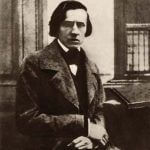Revolutionary Etude Op 10 No 12: A Melodic Shot Across Time
I have always respected Chopin for his ability to transcribe his emotions directly into the pieces that he wrote. Revolutionary Etude Op 10 No 12 is perhaps one of the best examples of this talent. It was written during the time that the Russians had forcibly occupied his home city of Warsaw and this event has not been lost on the composition. We are immediately thrown into a maelstrom of heart-stopping and complex descending progressions which only serve to heighten the sense of anticipation around the main theme. There are few lulls and these cascades are akin to waves breaking upon the shore of one’s heart; a clear allusion to his lamentations about the current political state.
Nearly Overwhelmed with Emotion
 One of the most striking qualities of Revolutionary Etude Op 10 No 12 is that the pianist has no choice but to go along with the increasingly powerful progressions as well as with the physically demanding left-hand semiquavers which are interspersed throughout the piece. I believe that this was written intentionally, as I often feel as if the opening bars represent a cannon shot across time; likening the onslaught of sound to an unwelcome and yet unavoidable invasion. I also feel that he chose Revolutionary Etude Op 10 No 12 to be played in C minor due to the fact that this key is arguably the most tempestuous. After Chopin was denied entry into the Polish armed forces due to his physical health, he began to descend into a rather dark time period and it was in this state that the piece was created (as well as other works such as Scherzo No. 2).
One of the most striking qualities of Revolutionary Etude Op 10 No 12 is that the pianist has no choice but to go along with the increasingly powerful progressions as well as with the physically demanding left-hand semiquavers which are interspersed throughout the piece. I believe that this was written intentionally, as I often feel as if the opening bars represent a cannon shot across time; likening the onslaught of sound to an unwelcome and yet unavoidable invasion. I also feel that he chose Revolutionary Etude Op 10 No 12 to be played in C minor due to the fact that this key is arguably the most tempestuous. After Chopin was denied entry into the Polish armed forces due to his physical health, he began to descend into a rather dark time period and it was in this state that the piece was created (as well as other works such as Scherzo No. 2).
[embedyt] https://www.youtube.com/watch?v=L51EmGJ6Zz4[/embedyt]
I consider Revolutionary Etude Op 10 No 12 to be one of the more technically challenging pieces written by Chopin and yet, my heart does not focus upon this quality alone. I instead imagine a country in uncertainty, a laboured heart and a man unsure of how to express his feelings by any other means than transcribing them to melody. However, we should also note that the key of this oeuvre changes to C major when approaching the end. I feel that this was done purposely; as if to leave confused as to the ultimate outcome. The brilliance of such momentum carries me away every time I play.
Leave a Reply